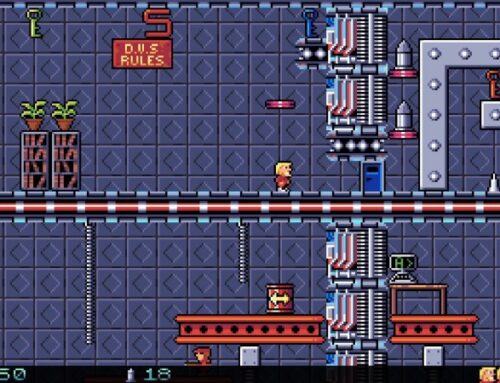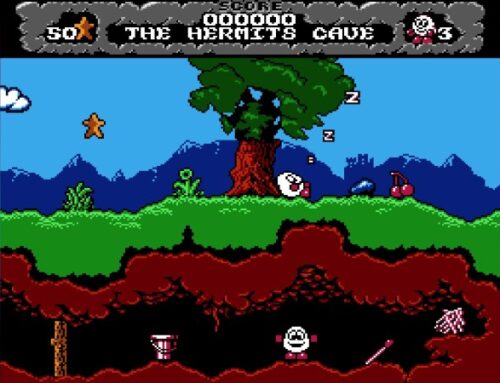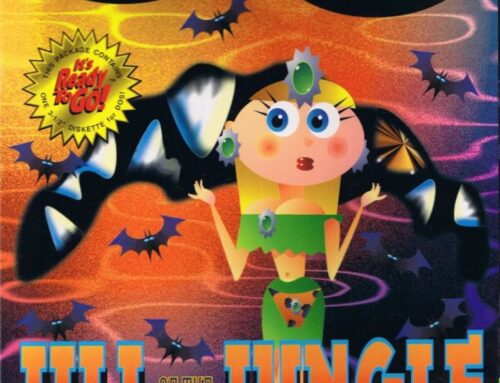The fourth Police Quest game, which dropped the numerical suffix and is instead referred to simply as Police Quest: Open Season, is an interesting and controversial game for a number of reasons.
Perhaps most notably, it marks the end of a few distinct eras for the series: most notably the end of the Sonny Bonds era, since in Open Season new protagonist John Carey takes the lead, and the end of Jim Walls’ tenure as the resident “staff cop” who advised the development team on the more authentic side of policing. Strictly speaking, Jim Walls left partway through Police Quest III: The Kindred — which is one of many reasons that game ended up being such a glorious mess — but Open Season marked the debut of a new advisor on the Sierra force.

That advisor was one Darryl F. Gates, former Chief of the Los Angeles Police Department between 1978 and 1992. This was a controversial choice even back when the game was first released in 1993 — Gates’ career brought him notoriety for a number of reasons that are a tad beyond the scope of this article — but Sierra’s Ken Williams felt that Gates’ experience would bring a distinctive sense of gritty realism to the new game.
Thus Gates became involved with the Police Quest series with Open Season, and would continue to act as an advisor as the series shifted towards its tactical SWAT subseries. It’s worth noting, however, that despite Gates’ headline appearance on the cover of the game, author-style, he didn’t actually write Police Quest: Open Season.
Instead, the game was written, directed, produced and designed by Tammy Dargan, a former segment producer on America’s Most Wanted, and someone who attracted controversy in their own right due to their perceived stereotyping of non-white ethnic groups in the game’s dialogue. Dargan, in turn, claimed that the dialogue she wrote for the black characters in the game was inspired by the American filmmaker and hip hop pioneer Fab Five Freddy’s work.

Police Quest: Open Season’s more controversial aspects have been covered amply elsewhere on the Internet, however, so today we’re primarily concerned with the game itself and how it stacks up to the rest of the series. Is it a good adventure game? Does Police Quest feel like Police Quest without Sonny Bonds, Marie Wilkans and the Bains brothers? Does the plot actually make sense this time around?
In short order, yes, yes, and just about. So let’s look at each of those aspects in a bit more detail.
Police Quest: Open Season begins with protagonist John Carey being called to the site of a murder. His friend and former partner Bob Hickman has been murdered in a fairly horrific way; his eyes glued shut, his body mutilated and some form of poison injected into his veins before being dumped in an alleyway in southern Los Angeles. A little investigation of the scene reveals a second body, too: that of an eight year old black boy from the neighbourhood, who has been riddled with bullets and left in a dumpster.

Right from the beginning, Open Season makes it clear that you’re going to have to do things properly — and also, rather interestingly for an adventure game, that not everything is your responsibility.
While in previous Police Quest games, Sonny Bonds was generally responsible for collecting and documenting evidence, only submitting it to the appropriate division at the police station when he was completely done with it, in Open Season you’ll find yourself collaborating a lot with the Scientific Investigation Division or SID.
In the initial scene, for example, Carey’s only real responsibilities are taking notes in his notebook, drawing a chalk line around the body (even though this is a trope from popular fiction rather than actual police practice) and then asking the SID representative on site to take photographs and retrieve samples as required.

It takes a little getting used to — particularly as the game’s narrator feels like he’s getting increasingly impatient with you every time you try to take care of things yourself — but after a while you get a good feel of what it’s Carey’s job to do, and what he can safely delegate.
From hereon, we’re into latter-day Sierra adventure territory. The driving sequences from the past games have (thankfully) been completely removed, replaced by an overview map of Los Angeles that indicates all the key locations you have discovered over the course of the story. Some of these are directly relevant to the main narrative; others, like the Police Academy, where Carey can practice his shooting every in-game day, are mostly there for bonus points and to add to the “procedural” feeling.
Notably, there’s a lot more depth to the dialogue system in Police Quest: Open Season than in previous games; rather than conversations being completely hands-off, here you often have the opportunity to question people using a list of subjects, many of which branch into their own selection of related topics where appropriate. This is most commonly seen when discussing autopsy results with the local coroner, but it’s also seen when interrogating witnesses, and it really adds to the investigative feel of the game.

Puzzle-wise, Police Quest: Open Season follows the cues of its predecessors by not being super-challenging for the most part; most situations can be resolved by following proper police procedure. That said, there are a couple of instances of what can only be described as adventure game moon logic; towards the end of the game, there’s a sequence where going through a door will result in you getting savaged by a dog unless you glue a broken car mirror to a drumstick and use it as a periscope beforehand.
Shortly after this you’ll be unable to progress unless you pick up the correct can of drink from a theatre concession stand — the only thing that sets this can apart is that it’s a cola can — and open it up to discover the skeleton key that is inexplicably hidden inside it. Said skeleton key can then be used both to unlock a paper towel dispenser, which conceals an important clue, and the door to the killer’s lair.
This sequence of events — along with the final confrontation with the killer, which is somehow simultaneously underwhelming and ridiculous — leaves the eventual conclusion of the game feeling somewhat rushed. It feels like Dargan and company were on a bit of a deadline and thus rather than giving us any extensive insight into the mind of our killer and why they do the things they do, it all boils down to “this person is weird and evil, kill them before they kill you”.

This is a bit of a shame, because all the build-up prior to this point was excellent. There’s a proper sense of doing detective work as you uncover the truth behind the game’s main case and several surrounding but ultimately unrelated incidents such as the death of the young boy in the opening scene.
The tension between the police, the press and people in positions of power in public office is represented and explored well. And there are some very welcome light-hearted moments with some colourful characters, too; a “serious” game this may be at heart, but it knows that sometimes everyone needs a bit of a break from all the doom and gloom.
Presentation-wise, Police Quest: Open Season looks quite dated today, though it does have a certain charm to it. Despite running in Super VGA in its CD-ROM incarnation (which is the most readily accessible version of the game today), the background and character graphics are all rendered in low-resolution, heavily pixelated 256-colour VGA. The backdrops are photographs and the large sprites are all video captured, making for some excellently fluid animation; there are a number of sequences that feature unique “close-up” animations, too, which is not something that was typically seen in earlier Sierra adventures.

The combination of the low resolution and the graphical techniques used means that it’s tricky to see most characters’ faces, which, for some people, might make it feel a little harder to develop a sense of attachment to them. Some “talking head” animations as seen in some earlier Sierra games wouldn’t have gone amiss — though it has to be said, the quality of the writing (controversial aspects aside) does a great deal to keep the story engaging and the characters interesting.
One unfortunate aspect of the game being from this era, however, is that it wasn’t designed with modern accessibility features in mind — and I’m not just talking about making the game playable to people who might have difficulties interacting with it.
No, I’m talking about something as simple as being able to have subtitles on screen at the same time as hearing speech; it’s one or the other here, so if you want to hear the voices, you’d better hope you can hear them properly.

I must confess, I ended up turning the speech off and relying on the text in the end; the experience felt no less satisfying for doing so, but it’s still unfortunate — particularly as Gabriel Knight: Sins of the Fathers, which Sierra released just a month after Open Season, nailed this aspect, with granular text and speech options available for both the characters and the narrator.
On the whole, Police Quest: Open Season is a good game, weak ending aside — and while it’s a shame to leave Sonny Bonds and company behind, there are a few knowing nods to past installments peppered throughout Open Season as pleasant little Easter eggs. Taken on its own merits, it’s a satisfying investigatory adventure and, outside of the couple of examples of “moon logic” noted earlier, probably the easiest Police Quest game to get into from a modern perspective. It’s a shame the series went off in its “SWAT” direction after this one; this first installment in a new era of Police Quest showed great promise, but sadly it was never to go any further.
Ah well. At least we can still enjoy this game and its predecessors today. And if you want to give them a shot for yourself, get yourself over to GOG.com and pick up a copy of the complete collection for yourself.




